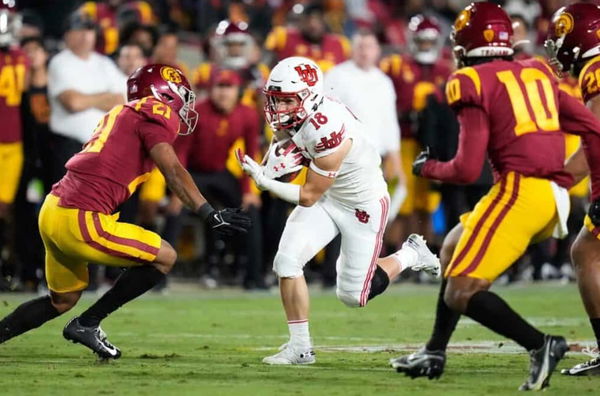

The NCAA has come up with a new policy that aims to better the financial state of athletes. With recent allegations and legal battles, the league has been under fire for its NIL policy. But after a lot of back and forth, it looks like their recent proposal will aim to fix everything regarding the backlash.
They’ve had a long-standing business model that prevented the universities from providing financial compensation to the athletes outside their academics. Charlie Baker, the NCAA president, has stated that the change in this preconceived foundation will have to change and is necessary at a time when the revenue generated by the top schools is set to grow massively and the legal strain to compensate these athletes justly continues to snowball.
ADVERTISEMENT
Article continues below this ad
What is the new policy that will radicalize the financial incentives for athletes?
NCAA president Charlie Baker plans to create a new subdivision within Division 1 that grants universities more autonomy regarding policymaking and will allow them to compensate their athletes in a better way. According to Baker’s proposal, the schools that choose to be a part of the new division can opt out and are required to meet minimum eligibility criteria.
NEWS: NCAA president Charlie Baker is proposing the creation of a new FBS subdivision that would allow the highest-resource schools to compensate athletes directly through a trust as well as NIL: pic.twitter.com/j7q4cjZ0oW
— Nicole Auerbach (@NicoleAuerbach) December 5, 2023
Moreover, the schools that choose to partake in the new division will be allowed to make their name, image, and likeness deals with their players in a way that will be best suited to their careers. This change is going to be celebrated by the league after a long-standing debate over the current NIL policy.
The athletes and teams have received the shorter end of the stick when it comes to NIL compensation. During the live coverage matches, the players weren’t being compensated for the usage of their names and images under the old policy. In my opinion, this change is revolutionary in the ways of college athletics and how they’re usually quite unfair towards the future of the said athletes. But while the community is celebrating this policy, here’s how it is going to be enforced.
How will the new NIL policy work?
To gain entry into the subdivision, a school will have to invest a minimum amount of $30,000 per year per athlete in what is being called a unique trust fund. The schools will be given the responsibility of determining when the athletes receive the funds, which, for four-year athletes, will amount to a total of $120,000. The new policy also dictated that 50 percent of the investment would be directed toward women athletes.
NCAA president Charlie Baker sent a letter to schools that proposes creating an FBS subdivision that allows schools to directly compensate athletes thru a trust fund & NIL.
🚨🚨🚨 pic.twitter.com/rM4ABSbZoF
— Unnecessary Roughness (@UnnecRoughness) December 5, 2023
This new subdivision will continue to be a part of the NCAA, and its schools will continue to compete for all the championships with other teams in Division 1. Furthermore, the NCAA will maintain the current championship model across all Division 1 sports except FBS football. The FBS football team will continue to operate under the guidance of the College Football Play-Off, as the proposal suggests.
The NCAA will continue to impose the “pay-for-play” method, but at least the schools will be getting a lot more freedom to compensate for their athletes. The new policies will lift the restrictions placed on a school’s direct association with the NIL and allow them to capitalize on the NIL within their jurisdiction. And while the battle has been won, the war against the NCAA continues to rage on in other financial matters.
The Johnson v. NCAA case that is currently going on against college athletics
Trey Johnson and other players in Division 1 have been arguing that student-athletes should be considered employees as per the Fair Labor Standards Act (FLSA) and should be financially compensated for the time they put in athletically.
Did you hear about the Johnson vs. NCAA case? The issue: "Whether NCAA Division I student-athletes can be employees of the colleges and universities they attend…" What are your thoughts? pic.twitter.com/Xx6F7f5SL2
— SL DeBarros Law Firm (@SLDebarros_Law) September 14, 2022
All the schools in the NCAA have agreed to not pay students to participate in intercollegiate sports. Moreover, the NCAA’s bylaws restrict schools from offering income to athletes. If the Johnson side wins the case, it will have a transformative effect on college sports if student-athletes are deemed employees of their universities, which in turn might lead to severe complications of its own.
ADVERTISEMENT
Article continues below this ad
In my opinion, I do not agree with the Johnson side’s decision to employ students on a wage in the name of the Labor Act. This would lead to the extreme commercialization of college football and make it less about the actual talent of the sport. Plus, everyone knows that if a student-athlete makes it big on the college level, he’s sure to make a name for himself in the NFL, which is known to pay for its talents in hefty amounts. This would ensure that only true talent makes it to the national level, rather than just a rat race for money at the university level.
But with all said and done, Baker’s new policy will set new standards for the athletes in terms of pay and help them in the future as well.
Read more: Deion Sanders v. Jim Harbaugh Contract Comparison: Who Earns More Annually?
ADVERTISEMENT
Article continues below this ad
Do you think that the new policy will radicalize college football? Let us know in the comments below.
Watch this story: “I Ain’t Thirsty”: Hours After Selena Gomez and Shannon Sharpe Went Viral, ESPN Analyst Claims He Didn’t Know A-List Celebrity
ADVERTISEMENT
ADVERTISEMENT
ADVERTISEMENT
ADVERTISEMENT
